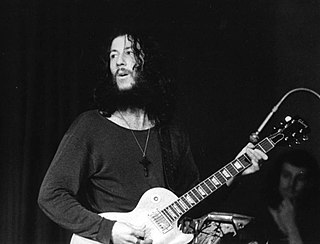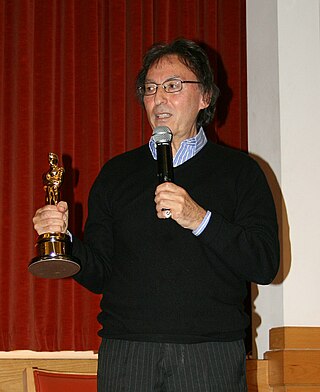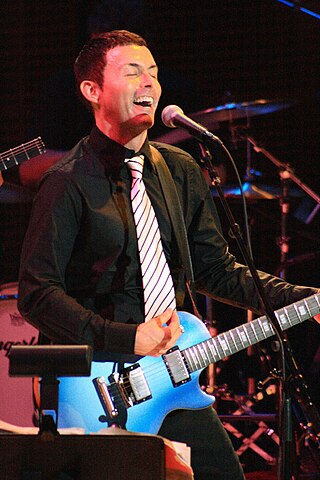A song book , or songbook, is a book containing lyrics and notes for songs.
Contents
Songbook may also refer to:
A song book , or songbook, is a book containing lyrics and notes for songs.
Songbook may also refer to:

Nicholas Peter John Hornby is an English writer and lyricist. He is best known for his memoir Fever Pitch (1992) and novels High Fidelity and About a Boy, all of which were adapted into feature films. Hornby's work frequently touches upon music, sport, and the aimless and obsessive natures of his protagonists. His books have sold more than 5 million copies worldwide as of 2018. In a 2004 poll for the BBC, Hornby was named the 29th most influential person in British culture. He has received two Academy Award for Best Adapted Screenplay nominations for An Education (2009), and Brooklyn (2015).

Peter Allen Greenbaum, known professionally as Peter Green, was an English blues rock singer-songwriter and guitarist. As the founder of Fleetwood Mac, he was inducted into the Rock and Roll Hall of Fame in 1998. Green founded Fleetwood Mac in 1967 after a stint in John Mayall's Bluesbreakers and quickly established the new band as a popular live act in addition to a successful recording act, before departing in 1970. Green's songs, such as "Albatross", "Black Magic Woman", "Oh Well", "The Green Manalishi " and "Man of the World", appeared on singles charts, and several have been adapted by a variety of musicians.

Lisa Anne Loeb is an American singer-songwriter, musician, author and actress. She started her career with "Stay " from the film Reality Bites, the first Billboard number one single for an artist without a recording contract. She achieved two additional top 20 singles with "Do You Sleep?" in 1996 and "I Do" in 1998. Her studio albums include two back-to-back albums that were certified gold: Tails and Firecracker.
Joy Electric is the brand label for a series of electropop/synthpop productions by Ronnie Martin. Martin began producing music under the Joy Electric name in 1994, after the demise of Dance House Children, a band Ronnie was in with his brother Jason Martin of Starflyer 59. Starflyer 59 bass player and Velvet Blue Music owner Jeff Cloud joined Joy Electric from 1996 until 2002. Joy Electric is currently a solo act.

Patricia Lynn Yearwood is an American country singer. She rose to fame with her 1991 debut single "She's in Love with the Boy", which became a number one hit on the Billboard country singles chart. Its corresponding self-titled debut album would sell over two million copies. Yearwood continued with a series of major country hits during the early to mid-1990s, including "Walkaway Joe" (1992), "The Song Remembers When" (1993), "XXX's and OOO's " (1994), and "Believe Me Baby " (1996).

Jane Monheit is an American jazz and pop singer.

Sandra Faye "Sandi" Patty is an American Christian music singer, known for her wide soprano vocal range and expressive flexibility.
The Great American Songbook is the loosely defined canon of significant 20th-century American jazz standards, popular songs, and show tunes.
"You Do Something to Me" is a song written by Cole Porter. It is notable in that it was the first number in Porter's first fully integrated-book musical Fifty Million Frenchmen (1929). In the original production, the song was performed by Genevieve Tobin and William Gaxton, performing the roles of Looloo Carroll and Peter Forbes, respectively.

Donald Blackstone, known professionally as Don Black, is an English lyricist. His works have included numerous musicals, movie, television themes and hit songs. He has provided lyrics for John Barry, Charles Strouse, Matt Monro, Andrew Lloyd Webber, Quincy Jones, Hoyt Curtin, Lulu, Jule Styne, Henry Mancini, Meat Loaf, Michael Jackson, Elmer Bernstein, Michel Legrand, Hayley Westenra, A. R. Rahman, Marvin Hamlisch and Debbie Wiseman.

Michael Jay Feinstein is an American singer, pianist, and music revivalist. He is an archivist and interpreter for the repertoire known as the Great American Songbook. In 1988, he won a Drama Desk Special Award for celebrating American musical theatre songs. Feinstein is also a multi-platinum-selling, five-time Grammy-nominated recording artist. He is the artistic director for The Center for the Performing Arts in Carmel, Indiana.
"They Can't Take That Away from Me" is a 1937 popular song with music by George Gershwin and lyrics by Ira Gershwin. It was introduced by Fred Astaire in the 1937 film Shall We Dance and gained huge success.
Silence is the lack of audible sound.
Elizabeth Ardis Mitchell is an American singer, songwriter and musician. She began her career performing with Lisa Loeb as the duo Liz and Lisa, then founded the indie rock band Ida in 1991, of which she continues to be a member. As a solo artist, she has been recording and performing music for children since 1998.
David Howard Lanz is a Grammy-nominated pianist and composer. His album Cristofori's Dream topped the New Age music charts in 1988.

A jukebox musical is a stage musical or musical film in which a majority of the songs are well-known popular music songs, rather than original music.
Bobbe Gorin "Beegie" Adair was an American jazz pianist and bandleader, whose career spanned more than 60 years.

Richard Barone is an American rock musician who first gained attention as frontman for the Bongos. He works as a songwriter, arranger, author, director, and record producer, releases albums as a solo artist, tours, and has created concert events at Carnegie Hall, Hollywood Bowl, SXSW, and New York's Central Park. He teaches the course “Music + Revolution” at The New School's School of Jazz and Contemporary Music, has served on the Board of Governors of The Recording Academy (GRAMMYs), serves on the Advisory Board of Anthology Film Archives, and hosts the "Folk Radio" show on WBAI New York.
"I Love Paris" is a popular song written by Cole Porter and published in 1953. The song was introduced by Lilo in the role of La Mome in the musical Can-Can. A line in the song's lyrics inspired the title of the 1964 movie Paris When It Sizzles.

Cage the Elephant is an American rock band formed in 2006 in Bowling Green, Kentucky. They moved to England and settled in London in 2008, shortly before their self-titled first album was released. The band currently consists of Matt Shultz (vocals), his older brother Brad Shultz, Nick Bockrath, Matthan Minster, Daniel Tichenor (bass), and Jared Champion (drums). The band's first album was released to much success, spawning several successful radio singles and gaining the band a large following in both the United States and the United Kingdom. It was influenced by classic rock, '90s alternative, blues, punk rock, and funk music. Lincoln Parish served as the band's lead guitarist from their formation in 2006 until 2013, when he left on good terms to pursue a career in producing.